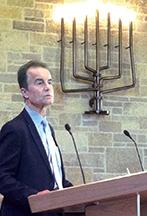“Hatred is not something that falls out of the sky. It’s not an evil that you’re born with,” said Bernd Wollschlaeger, M.D., to a packed sanctuary at Congregation Sinai on April 6.
Reared in Bamberg, Germany, Wollschlaeger found that past and present hatred was often hushed in his town. His quest for truth led him to discover his father’s role and views in World War II as a highly decorated Nazi tank commander.
And his discoveries led him to conversion to Judaism. He shared with the Milwaukee audience a brief version of the story he told in his 2009 book “A German Life: Against All Odds, Change is Possible.”
“I believe hatred is something that we acquire by allowing words of hatred,” he said. “Where stereotypes and prejudice are being verbalized in words and these words are being uttered, they fall on fertile ground, they sprout into deeds, and if those deeds go left unchallenged they can form acts of hatred…
“Habits will form and will influence the development of bad characters of people, [and] if left unchallenged will eventually form social norms. And that explains, but does not excuse, that an entire people like the Germans looked away, sophisticated, educated people, because it was a social norm to look away” from the killing of Jews.
But Wollschlaeger could not look away as he learned about his father’s past.
In his childhood home, the family’s landlady, the countess, lived upstairs and displayed a picture of a soldier. The soldier’s demeanor and uniform resembled his father’s, but his father referred to that man as “the traitor.”
The man was Claus von Stauffenberg, one of the German army officers who attempted to assassinate Nazi dictator Adolf Hitler in 1944.
When Wollschlaeger was 14, Palestinian Arab terrorists at the 1972 Olympics in Munich, Germany, murdered Israeli athletes, whereupon the German newspapers headlined, “Jews Killed in Germany, Again.”
When Wollschlaeger asked his father what the headline meant, he received the reply, “In our house we don’t talk about them. We’re over with them,” meaning Jews.
Bernd’s teachers, on the other hand, admitted German atrocities. But his father said, “Your teachers are all communists. They’re liars.”
Later, Wollschlaeger attended a peace conference for Israeli Jewish and Arab youths in Germany. This was the first time he met Jews.
He was befriended by a young woman who encouraged him to visit her family in Israel, which he did. The woman’s father turned out to be a Holocaust survivor.
Wollschlaeger became more curious about Jews and Judaism. He sought out the Jewish community of Bamberg, a remnant of elderly Holocaust survivors. Befriended by a man named Yitzchak, Bernd slowly grew close to this community while becoming increasingly alienated from his family.
When Christmas fell on the eve of a Shabbat, he refused to participate in his family’s celebration. At that point his family completely cut him off.
Ultimately, he decided to covert to Judaism. After doing that and completing his medical studies, in 1987 he purchased a one-way ticket to Tel Aviv. He served in the Israel Defense Forces as a military doctor.
During his IDF service, he kept his past a secret. “I was scared” of what other Israelis would do if they “find out that underneath this uniform is the son of a Nazi,” he said.
He married an Israeli American and they had a son. Eventually, his son asked, “Who is my grandfather?”
Wollschlaeger thought, “How am I supposed to explain [this] to him?” He decided there was only one right answer, the truth.
Later, the school his son attended held a “Family History Day,” during which his son said, “My grandfather was a famous Nazi.” This prompted a call from the principal and the school’s rabbi. The rabbi encouraged Wollschlaeger to tell his story to others.
Wollschlaeger said that his parents “never looked back into history to learn from it. That’s what I had to do. I looked back into history, understood the mistakes, and acted accordingly and made a very radical change in my life.”
“We cannot change history. We cannot run away from it either. Any history, personal or collective, we have to make the best out of it, to learn a lesson and not to repeat it,” he said.
Wollschlaeger currently practices medicine in Miami and is clinical assistant professor at the University of Miami and Florida State University.
The event was sponsored by the Nathan and Esther Pelz HolocaustEducation Resource Center of the Milwaukee Jewish Federation, the Harry & Rose Samson Family Jewish Community Center, and the Peltz Center for Jewish Life. On April 11 and 12, Wollschlaeger also spoke at Congregation Shalom, sponsored by Shalom’s Sisterhood.
Joshua Becker is a Spanish teacher for Shorewood Public Schools and a freelance writer.



